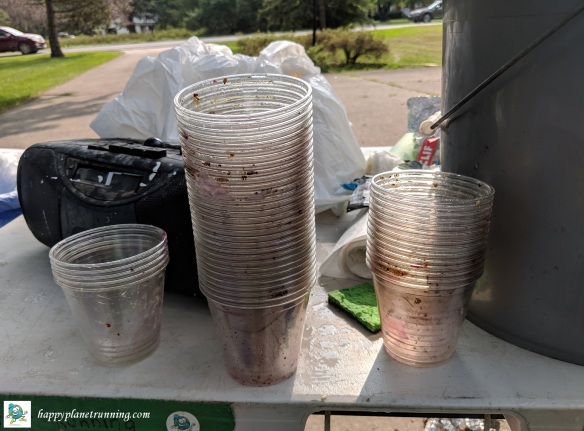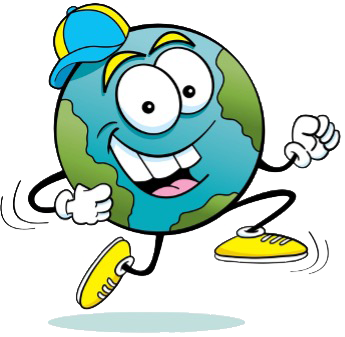“Come taste the wine, come hear the band, . . . and run a half marathon!”
Actually, you get the run in first. Then you collect your medal and finisher’s wine tumbler, and head to the post-race party featuring food and drink from local vendors, and wine from the vineyard hosting the event. For the runners, it’s one grand morning.
For the Zero Waste team, not so much. What happens when you’re short on volunteers and collection bins at one of the busiest and most waste-producing events of the year? All is revealed below!
Sustainability Report: Running Between the Vines 2018
Date: August 18, 2018
Event company: RF Events, Ann Arbor MI
Location: Sandhill Crane Vineyards, Jackson MI
# Attendees: 2,200 runners, plus family and spectators
Zero Waste Team size: 3
 Results
Results
- Compostables: 246 lbs.
- Recyclables: 627.9 lbs.
- Landfill: 11.9 lbs.
Comparison vs. 2017: Landfill increased by 3 pounds. Diversion percentage was basically unchanged (98.7 percent vs. 99 percent in 2017). An excellent result, especially given the challenges.
Main contributors to landfill trash were dog poop and diapers, cooling packs, and broken wine tumblers (in the black bag in the photo).

Race Overview
Running Between the Vines is a set of early morning 5K, 5 mile, and half marathon starting and ending at a vineyard. Afterward, runners can taste the vineyard’s wines and enjoy local specialties while listening to a live jazz band. It’s the second in a series named the “Thirsty Three”.
Race waste occurs at the line of porta-potties, in the finish area from cardboard, banana peels, and water bottles, and in the party area from vendor food and materials. They are not close to each other, so keeping on top of them all is a tall order.
Zero Waste Plan
We rented a 20-yard recycling rolloff from Emmons Services like last year. They do not accept waxed paper cups, so I took them to Western Washtenaw in a U-Haul trailer, along with the compostables (for pickup at RF by My Green Michigan). The trailer was also used to collect finish line cardboard, which was driven up to the rolloff at takedown.

We were short on cardboard waste bins, so I cut back to one tent in the finish area and two in the party area. We set up stations (bins only) near the recycling rolloff and near the registration tent (moved later to the party area). The porta-potties got one bin per wash station (for all waste) instead of two per station (compost & recycle).
Based on last year’s large number of discarded water bottles along the starting line, I set up three bins there, and moved them to the finish area after the 5K start. Also based on last year, we set up composting and recycling bins at the vineyard’s coffee and mac & cheese table, and provided them with compostable cups, bowls, and forks.
I had only one volunteer signed up (Cici), so I assigned her to monitor the party area while I rotated among the other stations.

My wife came later to help with takedown and sorting, and we had one extra helper before and after event takedown, who stayed late until we were finished. Thanks again, Alicia!

What Went Well
The bins along the start line reduced the number of discarded water bottles. But I moved them before the 5 mile race started, and quite a few bottles were discarded by those runners.
Adding signs to “please empty water bottles and put caps on” made a noticeable difference from previous events. Many fewer bottles had to be emptied, and far fewer loose caps were found.
The coffee station required some sorting, but overall the situation was much improved from last year.
The finish line volunteers did a great job breaking down all the cardboard and putting it in the trailer.
I collected the Sterno cans used to heat the meatballs. Hopefully I can find a Boy Scout troop who wants them, or find a way to clean them and recycle them.
Challenges
The party area included a vendor serving samples of hummus and olive oil. They were in compostable containers (hooray!) but many runners mistakenly put them into our recycling bins, causing contamination of otherwise clean materials. In particular a large number of plastic wine cups got oily and had to be washed by hand afterward.

The large amount of waste produced by this event, combined with a shortage of volunteers, resulted in a lot of late sorting in hot sun.
The bags from the porta-potty station, predictably, required a lot of digging through compostable paper toweling to remove the recyclable materials.
Post-Event Waste Processing
My wife and I hand-washed the oily wine cups at home after the event. We also sorted out the small plastics, disposable gloves, and other TerraCycle materials from miscellaneous waste given us by the food tables.
Opportunities for Improvement
A couple more volunteers would greatly help with staying on top of sorting during the event, thus reducing final sort at the end.
Custom tent signage, with photos, might help with the mixed waste problem in the party area. Too many people tossed greasy materials into the recycling bins.







